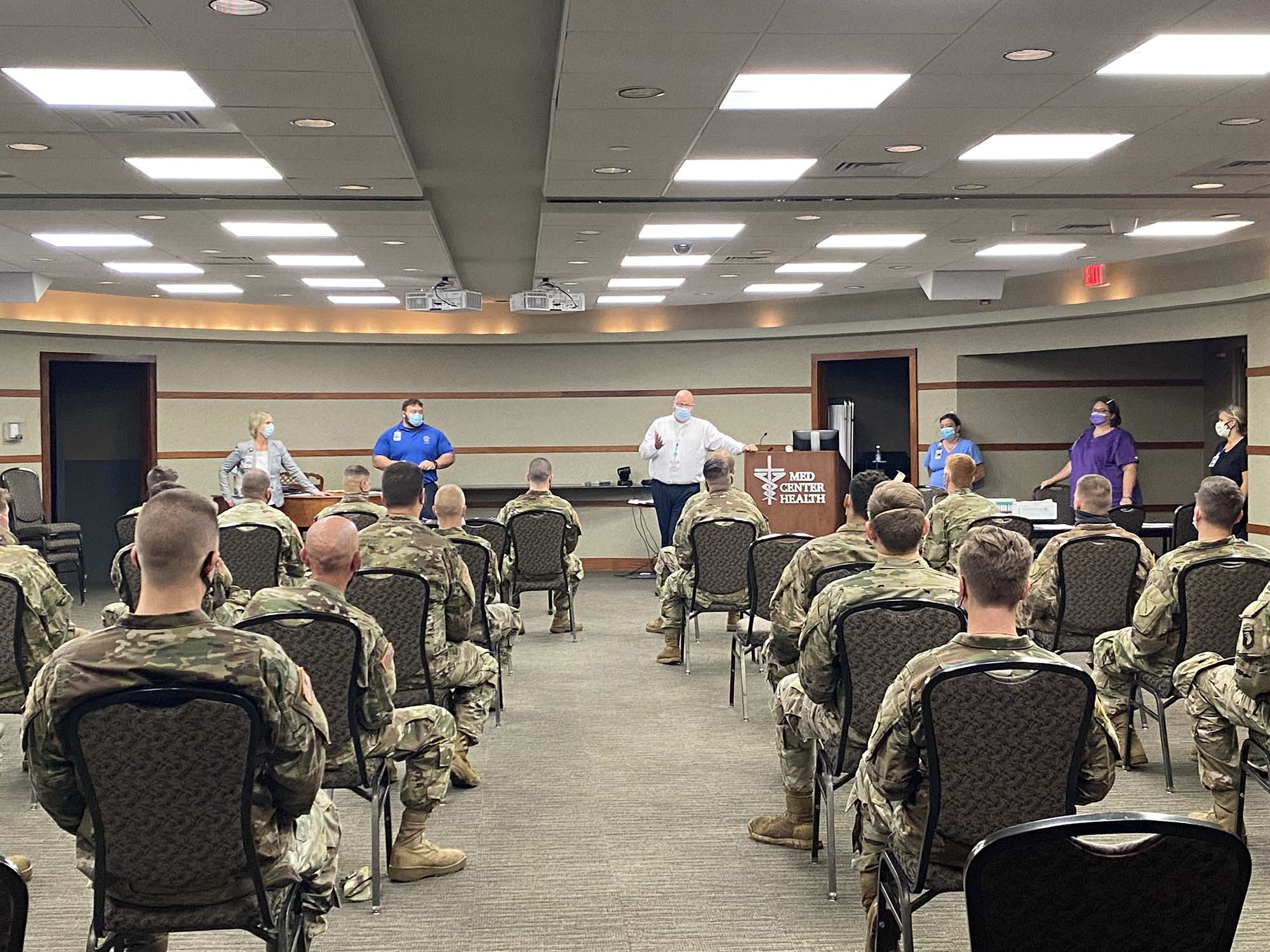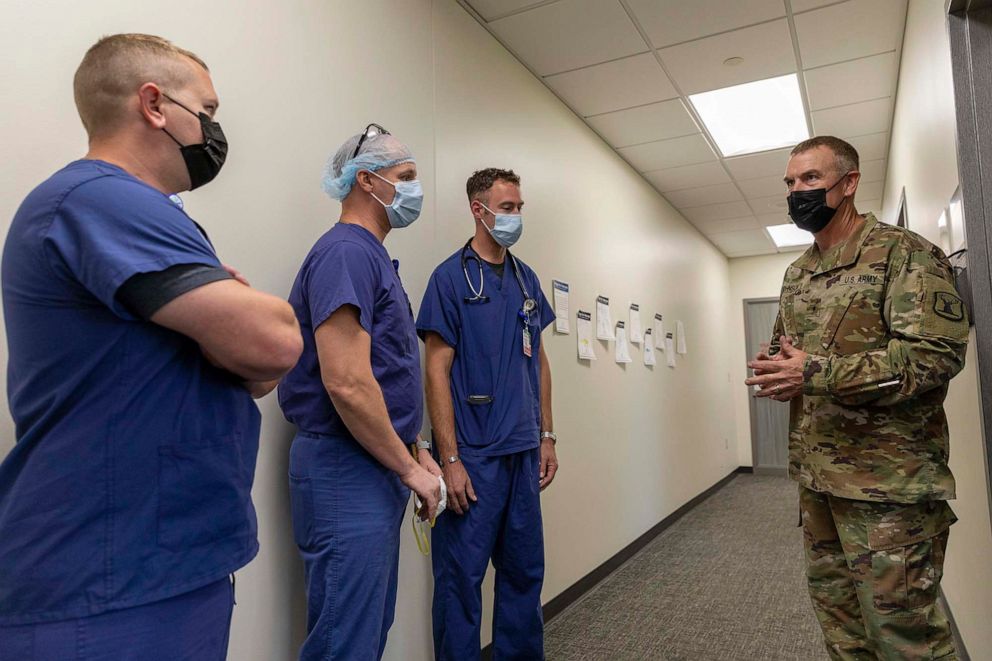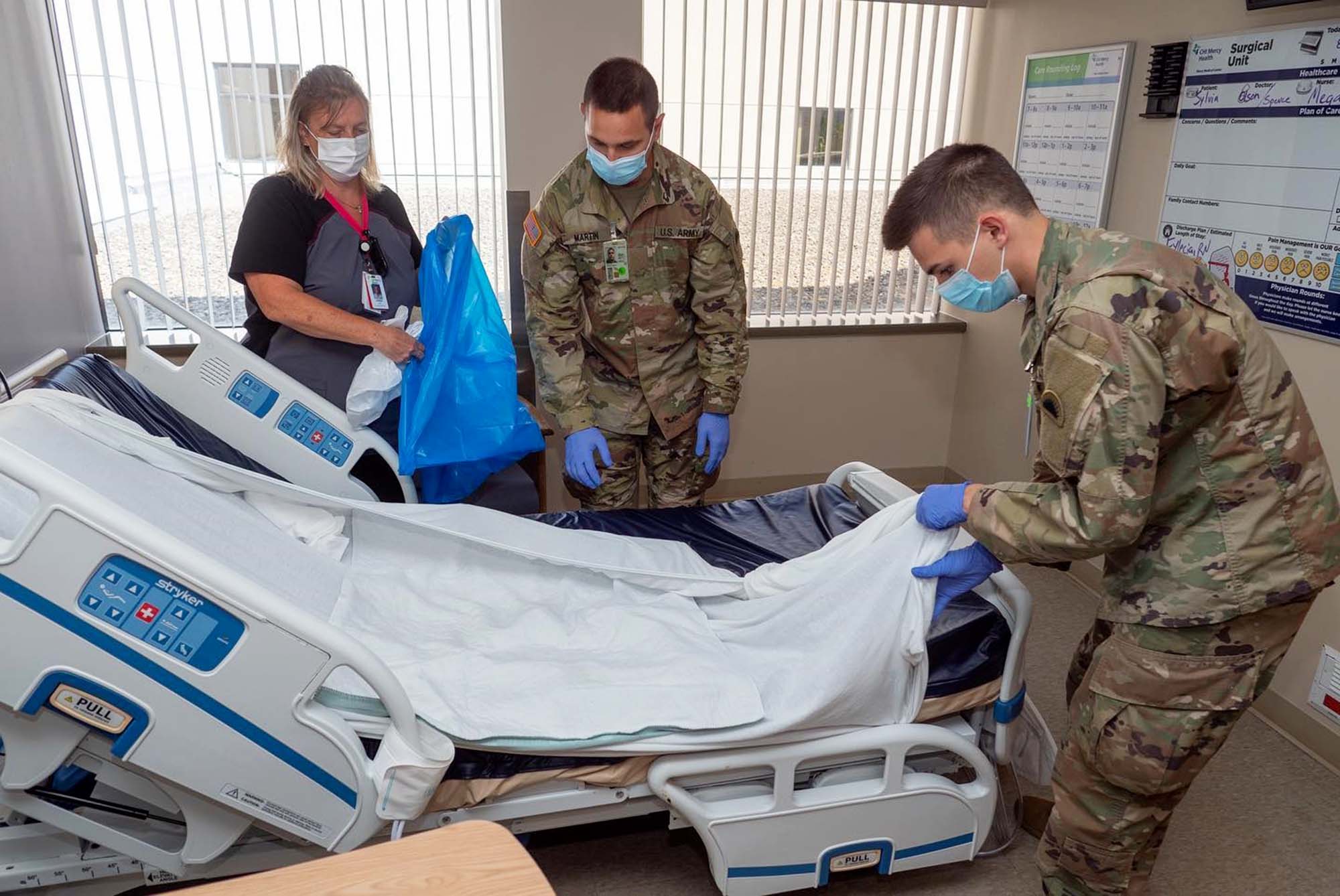How National Guard members are helping hospitals on the brink during delta surge
"They're in a bad way and we're really just helping to alleviate that workload."
When Lt. Nathan Brashear saw the call for National Guard service members to help as hospitals were reaching a crisis point during Kentucky's delta surge, he didn't hesitate to volunteer.
For about two weeks, Brashear, a member of the Kentucky Army National Guard, has been leading a team of 30 National Guard members at The Medical Center at Bowling Green, doing "everything little thing" they can to help give the hospital staff a much-needed break.
"That's one thing that makes this mission so important to us as soldiers," Brashear, who was a deputy jailor before he went on active-duty orders, told ABC News. "We live and work in these communities. So for us to be able to support the communities is something that really impacts us."
In recent weeks, several states have deployed hundreds of National Guard service members to help overwhelmed and understaffed hospitals, as COVID-19 hospitalization rates have reached points not seen during the pandemic.
The service members are not doing clinical work, but instead offering administrative and logistical support so hospital staff can focus on patient care. That could be anything from taking patients to appointments to cleaning beds to serving and clearing food.

"This is really the latest in demonstrated need that we're seeing, obviously across the state and nation, that a lot of these hospitals are feeling the strain -- both increased patients and a decrease in the available personnel to really help take care of everybody," Lt. Col. Stephen Martin, director of public affairs for the Kentucky National Guard, told ABC News. "Our main mission there is really just to offload the logistical and administrative support that those hospitals have so that the full-timers there can better care for the needs of the patients that are coming in."
The Kentucky National Guard was winding down its pandemic response, which has included helping set up drive-through COVID-19 testing sites and assisting food banks, when, about three weeks ago, it was called for the first time during the pandemic to assist hospitals overburdened by COVID-19 patients -- most of them unvaccinated.
The size of National Guard teams and length of their deployment varies by hospital size and demand, and will stay as long as they can in whatever capacity is needed, Martin said.
"We as Guardsmen fancy ourselves as Swiss Army knives. We've got multiple skillsets, not only in what we're trained on but being able to accomplish the mission before us," he said. "We can send a small team into the hospital and say, 'Here's your left and right limits, these are the things that we want you to focus on and provide support to, and more than anything, just help these folks out.'"
"They're in a bad way and we're really just helping to alleviate that workload for a little it, let them catch their breath and catch up and really focus on the needs of the patients in the hospital," he added.
Over two-thirds of Kentucky hospitals have critical staffing shortages as they're overrun with COVID-19 patients, and doctors are "quickly approaching" the point where they would need to ration care, Gov. Andy Beshear told CNN on Wednesday.
More than 100 soldiers and airmen had already been deployed to four hospitals, including The Medical Center at Bowling Green, when Beshear announced Friday that over 300 more will be sent to 21 additional hospitals in the state's largest-ever National Guard deployment for a health crisis.
"Our hospitals are at a breaking point," Beshear said during a COVID-19 briefing Friday. "We have 93 total ICU beds left statewide. That is one of the lowest numbers, I think they would tell you, in our lifetime."
The announcement came a day after Kentucky set new records for its statewide COVID-19 testing positivity rate, reaching 14%, and the number of patients on ventilators, the governor said.
Kentucky is not the only state to turn to the National Guard for COVID-19-related hospital support in recent weeks.
Late last month, Idaho Gov. Brad Little announced the state was deploying up to 150 Guardsmen, among other personnel, to help overwhelmed hospitals.

More than 600 patients are hospitalized with COVID-19 in Idaho, the highest on record for the state, as the number of intensive care unit beds dwindles and hospital staff are stretched thin. On Tuesday, Idaho public health leaders announced they had activated "crisis standards of care" for the state's northern hospitals, enabling them to ration care.
In Oregon, Gov. Kate Brown announced last month she was deploying up to 1,500 National Guard members to hospitals around the state to provide support.
The service members have been met by applause by grateful health care workers as they've arrived at their hospitals.

Over the past few weeks, they've helped with nonclinical tasks, including screening visitors at hospital entrances, manning COVID-19 hotlines and changing patients' bedding in the ICU.
Some have even used their talents to boost morale. Senior Airman Skadi Freyr of the Oregon National Guard has been playing piano during her lunch break while working at Oregon Health & Science University in Portland.
"A beautiful moment of someone in uniform who was blessing us on her break with some beautiful music, which really was grounding for me, to remind me of the beauty and the good in the midst of this really hard time," OHSU oncology social worker Jen Smith told the Oregon National Guard last week.
Freyr said she doesn't have any plans to stop playing after seeing the impact on staff.
"Now that I've seen that it has such a good sort of healing effect on people, it makes me more driven to do it, because I know that it's really gonna just help them," she said. "And I really like to be of service."



